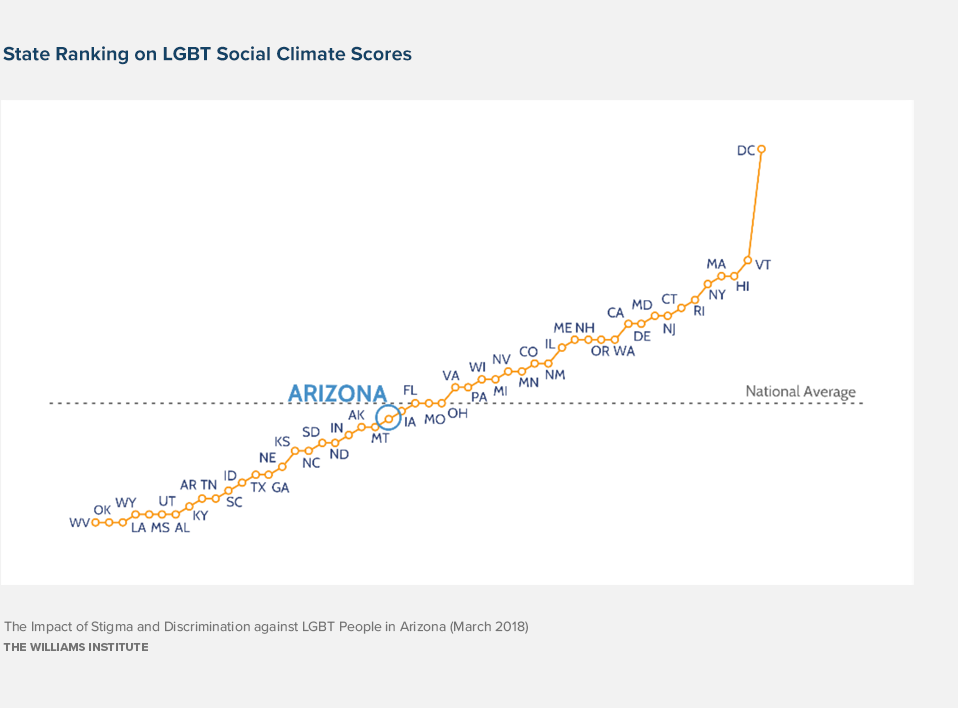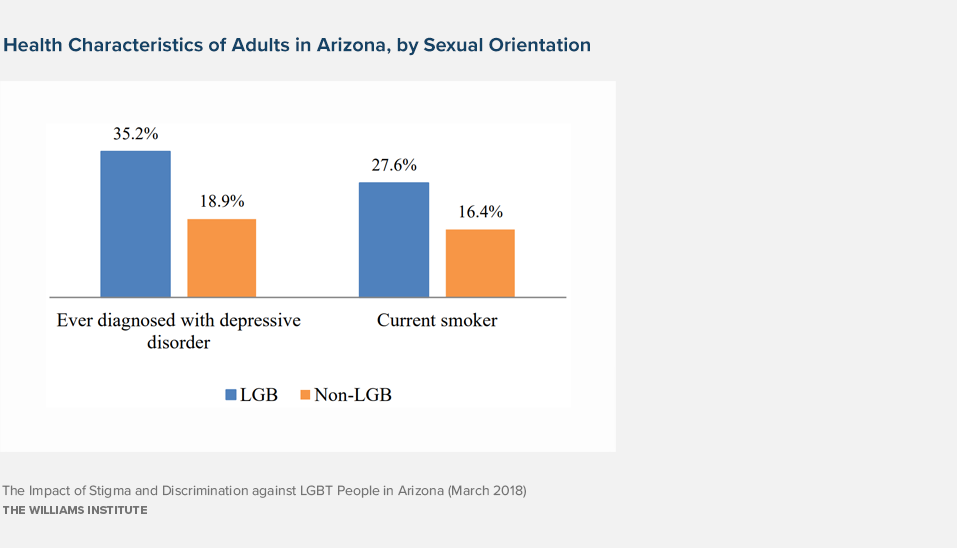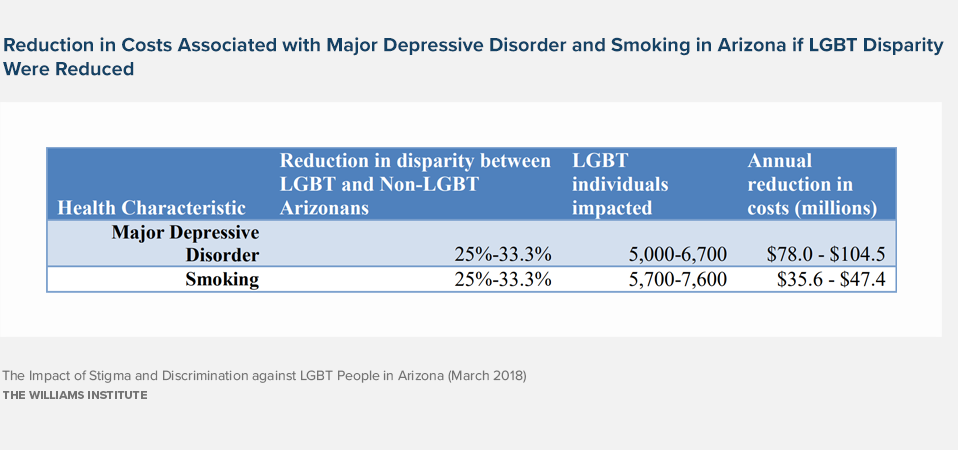Executive Summary
Arizona is home to over 203,000 LGBT adults and 45,550 LGBT youth. LGBT people in Arizona lack important legal protections and face a less supportive social climate than LGBT people in many other states. For example, statewide laws in Arizona offer no protections from discrimination based on sexual orientation or gender identity in areas such as employment, housing, and public accommodations. State laws in Arizona also fail to adequately protect LGBT students from bullying. In terms of social climate, Arizona ranks 29th in the nation on public support for LGBT rights and acceptance of LGBT people. However, a number of businesses and some localities in Arizona have adopted LGBT-inclusive non-discrimination policies, and social attitudes toward LGBT people are becoming more positive over time.
The legal landscape and social climate for LGBT people in Arizona likely contribute to an environment in which LGBT people experience stigma and discrimination. Stigma and discrimination can take many forms, including discrimination and harassment in employment and other settings, bullying and family rejection of LGBT youth, overrepresentation in the criminal justice system, and violence. Research has linked stigma and discrimination against LGBT people to negative effects on individuals, businesses, and the economy.
In this study, we provide data and research documenting the prevalence of several forms of stigma and discrimination against LGBT adults and youth in Arizona, including discrimination and harassment in employment, housing, and public accommodations; bullying and harassment in schools; and family rejection of LGBT youth. We discuss the implications of such stigma and discrimination on LGBT individuals, in terms of health and economic security; on employers, in terms of employee productivity, recruitment, and retention; and on the economy, in terms of health care costs and reduced productivity.
To the extent that Arizona is able to move toward creating a more supportive environment for LGBT people, it would likely reduce economic instability and health disparities experienced by LGBT individuals, which, in turn, would benefit the state, employers, and the economy.
Key Findings
Prevalence of Stigma and Discrimination against LGBT People in Arizona
LGBT People in Arizona Experience Discrimination in Employment, Housing, and Public Accommodations
- The 2015 U.S. Transgender Survey report documented evidence of discrimination against transgender people in a range of areas, including employment, housing, and public accommodations. For example, in terms of employment discrimination, the survey found that of transgender respondents from Arizona who had or applied for a job in the prior year, 27% reported “being fired, being denied a promotion, or not being hired for a job” because of their gender identity or expression. Ten percent of respondents who had a job in the prior year reported being verbally harassed and 1% reported being sexually assaulted at work in the prior year because of their gender identity. Additionally, “15%of respondents who had ever been employed reported losing a job at some point in their lives because of their gender identity or expression.” Similar percentages of transgender people in Arizona had experienced discrimination in housing or public accommodations in the prior year.
- A 2014 survey of faculty and staff at the University of Arizona found that LGBTQ+ faculty and staff have experienced harassment and discrimination on campus. Nearly 75% of LGBQ+ and 18% of trans faculty and staff said that they had heard anti-LGBTQ+ slurs and comments on campus. Six percent of LGBQ+ and 9% of trans faculty and staff said they heard these comments once per day. Over four percent of LGBTQ+ faculty and staff said they felt intimidated or threatened and 3% said they feared for their physical safety on campus because of their sexual orientation or gender identity.
- A public opinion poll of Arizona voters conducted in 2017 found that 64% of respondents said that there continue to be many ways that LGBTQ people are treated unequally, despite now being able to legally marry.
- A public opinion poll conducted in 2016 found that 59% of Arizona residents thought that gay and lesbian people experience a lot of discrimination in the U.S. and 64% of residents thought that transgender people experience a lot of discrimination in the U.S.
- Analysis of aggregated public opinion data collected from 2011 through 2013 indicated that 79% of Arizona residents thought that LGBT people experience discrimination in the state.
- Instances of employment, housing, and public accommodations discrimination against LGBT people in Arizona have also been documented in a number of court cases and administrative proceedings, and in the media.
LGBT Youth and Young Adults in Arizona Experience Bullying and Harassment at School
- In response to a 2014 survey, many LGBQ+ and trans students at the University of Arizona reported that they had experienced verbal harassment and discrimination related to their sexual orientation and gender identity on campus. Twenty-two percent of LGBTQ+ students reported experiencing discrimination based on their sexual orientation or gender identity on campus, and most (70%) did not report the incident to an authority figure, such as the Dean of Students or the University of Arizona Police Department. Additionally, over 97% of trans students and 64% of LGBQ+ students reported hearing anti-LGBTQ slurs and comments on campus at least sometimes. Approximately 5% of LGBQ+ students said they felt “not very safe” and 51.2% said they felt only “somewhat safe” on campus.
- The 2015 GLSEN National School Climate Survey of LGBTQ middle- and high-school students found that 71% of respondents from Arizona said they had experienced verbal harassment based on their sexual orientation at school, and 55% said they had experienced verbal harassment based on their gender expression at school in the year prior to the survey. Many students also reported experiencing physical harassment based on their sexual orientation (29%) or gender identity (20%) at school in the year prior to the survey. In addition, 11% of respondents reported that they had experienced physical assault at school because of their sexual orientation and 10% of respondents said they had experienced physical assault because of their gender identity at school in the year prior to the survey.
- The 2015 National Transgender Survey report found that 48% of survey respondents from Arizona who were out or perceived as transgender while in grades K-12 experienced verbal harassment, 24% experienced physical assault, and 8% experienced sexual violence while in school.
Impact of Stigma and Discrimination on LGBT Individuals
LGBT People in Arizona Experience Economic Instability
- Stigma and discrimination against LGBT workers can lead to economic instability, including lower wages and higher rates of poverty.
- Gallup polling data from 2012-2014 found that 39% percent of LGBT adults in Arizona reported having an annual household income below $24,000, compared to 24% of non-LGBT adults.
- LGBT adults in Arizona were also nearly twice as likely to report that they did not have enough money for food as non-LGBT adults (35% v. 18%).
- In addition, LGBT adults were more likely to be unemployed: 12% of LGBT adults in Arizona reported that they were unemployed compared to 8% of non-LGBT adults.
- The 2015 U.S. Transgender Survey found that 16% of respondents in Arizona were unemployed and 28% were living in poverty. In addition, 14% of respondents in Arizona reported experiencing homelessness within the prior year because of being transgender.
LGBT Adults and Youth in Arizona Experience Health Disparities
- Research indicates that stigma and discrimination contribute to adverse health outcomes for LGBT people such as major depressive disorder, binge drinking, substance use, and suicidality. Similarly, bullying and family rejection, as well as social stigma more broadly, have been linked to an increased likelihood of school dropout, suicide, and substance use among LGBT youth.
- LGBT adults in Arizona who completed the 2012 Behavioral Risk Factor Surveillance System survey were significantly more likely to have been diagnosed with a depressive disorder by a health care professional than non-LGB adults who completed the survey (35.2% v. 18.9%). In addition, LGB adults were significantly more likely to report current smoking (27.6% v. 16.4%) than non-LGBT adults.
- The 2015 Arizona Youth Risk Behavior Survey found that LGB students were much more likely than non-LGB students to have seriously considered suicide (47.2% v. 14.9%), to have planned for suicide (42.3% v. 13.4%), and to have required medical care as a result of a suicide attempt (9.9% v. 1.9%) in the year prior to the survey. LGB students in Arizona were also more likely than non-LGB students to report smoking cigarettes (20.7% v. 9.1%), drinking (44.6% v. 33.8%), and using marijuana (37.4% v. 22.0%) in the month prior to the survey.
- Similarly, a 2014 survey of college students at the University of Arizona found that 43.4% of LGBTQ+ students said they had been diagnosed with depression, 40.8% said they had been diagnosed with anxiety, and 32.2% said they had been diagnosed with both. Among non-LGBTQ+ students, 14.0% said they had been diagnosed with depression, 19.4% said they had been diagnosed with anxiety, and 14.0% said they had been diagnosed with both. Additionally, 25.2% of LGBTQ+ students said they had seriously considered attempting suicide at least once in the prior school year and 4% had actually attempted suicide at least once in the prior school year. By comparison, 4.0% of non-LGBTQ+ students said they had seriously considered attempting suicide at least once in the prior school year and 1.1% had actually attempted suicide at least once in the prior school year.
Economic Impacts of Stigma and Discrimination
Discrimination against LGBT People in Employment and Other Settings Has Economic Consequences for Employers and the State Government
- Productivity. Unsupportive work environments can mean that LGBT employees are less likely to be open about their sexual orientation or gender identity at work, and more likely to be distracted, disengaged, or absent, and to be less productive. These outcomes could lead to economic losses for state and local governments, as employers, and private businesses in the state. Given that an estimated 112,000 workers in Arizona identify as LGBT, the loss in productivity from a discriminatory environment could be significant.
- Retention. LGBT employees in less supportive work environments feel less loyal to their employers and are more likely to plan to leave their jobs. Given the average replacement costs of an employee, public and private employers risk losing $9,260, on average, for each employee who leaves the state or changes jobs because of an unsupportive policy or social environment in Arizona.
- Recruitment. Many LGBT and non-LGBT workers, in particular, those who are younger and more highly educated, prefer to work for companies with more LGBT-supportive policies, and in states with more supportive laws. To the extent that workers from other states perceive Arizona to be unsupportive of LGBT people, it may be difficult for public and private employers in the state to recruit talented employees from other places.
- Public Benefits Expenditures. Discrimination can lead to hardships for individuals including lower earnings, underemployment or unemployment, and loss of housing, which in turn can lead to increased reliance on public benefits. As an illustration of how the state is impacted by the economic instability of LGBT residents, we estimate that discrimination in the workplace against transgender people annually costs Arizona approximately $562,000 in state Medicaid expenditures.
Bullying and Family Rejection of LGBT Youth Negatively Impact the Economy
- Bullying and family rejection of LGBT youth can cause them to miss or drop out of school, become homeless, or be unemployed or underemployed.
- In response to the 2015 U.S. Transgender Survey, 17% of respondents who experienced harassment while K-12 students said the harassment was so severe that they had to leave school.
- School drop-out and homelessness that arise due to bullying and family rejection are harmful not only to individual LGBT youth, but also have societal consequences in that they reduce the capacity of these youth to contribute to the economy as adults.
- In addition, school-based harassment and family rejection can increase costs to the state via Medicaid expenditures, incarceration, and lost wages. The Jim Casey Foundation has estimated that homelessness, juvenile justice involvement, and poor educational and employment outcomes cost nearly $8 billion per cohort that ages out of foster care each year in the U.S. The best available data suggest that LGBT youth make up one-fifth, if not more, of each annual aging out cohort.
Health Disparities for LGBT People Negatively Impact the Economy
- A more supportive legal landscape and social climate for LGBT people in Arizona would likely reduce health disparities between LGBT and non-LGBT people, which would increase worker productivity and reduce health care costs.
- We estimate that reducing the disparity in major depressive disorder between LGBT and non-LGBT people in Arizona by 25% to 33.3% could benefit the state’s economy by $78.0 million to $104.5 million annually; reducing the disparity in current smoking by the same proportion could benefit the state’s economy by $35.6 million to $47.4 million in increased productivity and reduced health care costs each year.


